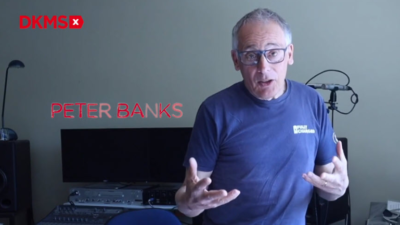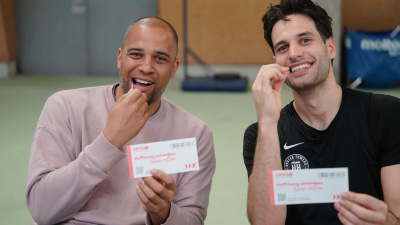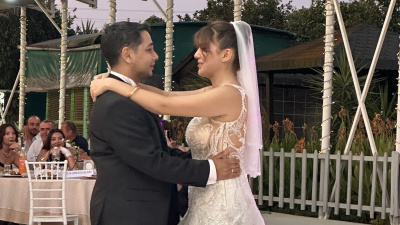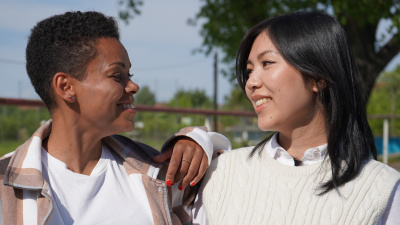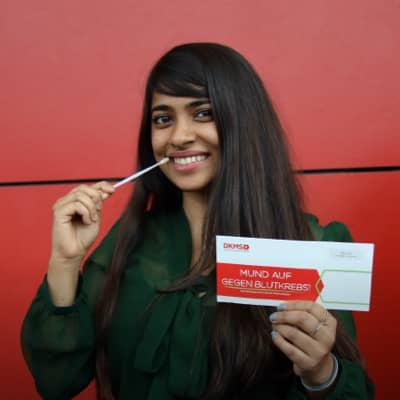DKMS-Talk: Composer Peter Banks on music and cancer
Marion, who was diagnosed blood cancer, deeply moved the British musician with an inspiring dance video for his song "1980-F"
Mother of two,Marion was diagnosed with an acute form of blood cancer and received a secondchance at life through a blood stem cell transplantation a few weeks ago. On one of her better days in the hospital she danced with joy to her favourite song "1980-F" by the band "After the Fire" while filming herself with her smartphone. The DKMS editorial team spoke to the composer of the song and keyboardist Peter Banks about the emotional video - it is a real inspiration for the artist. He is now in regular contact with Marion and says: Music is so important to people and it is so important that music is heard.
The 45-year-old Marion Kremer from Großbottwar in Baden-Württemberg is currently fighting bravely against blood cancer and is appealing to people to sign up as potential donors with DKMS so that many other patients in need can receive a second chance at life.
A few weeks after her stem cell transplant, the mother of twins received the message that she was „in remission“, which means that the leukemia cells could be suppressed by the treatment and they are currently no longer microscopically detectable in bone marrow and blood. She shows her joy, hope and courage to face impressively in an emotional video clip even during treatment in the hospital. The music she dances to has a very special meaning for her. „The song you hear in the background is ‚1980-F‘ by After the Fire. It became one of the songs that motivated, inspired and energized me the most during my „walks“ in my hospital room, „she says. “It also cheered me up whenever I was unable to move physically due to the pain and side effects of the treatment. It took me three days to recover after the little dance – but it was sooo worth it. Thank you Peter Banks for composing this great ’spirit lifter‘! „
In 1980 the Brit composed the song, which then caused a sensation in Germany as well as later on a cover of the Falco hit „Der Kommissar“.
Peter, thank you for taking the time for our interview. So how are you, especially in these days of the corona crisis?
These are very strange times we live in and I think it is best that we follow the guidelines our respective governments issue us. We are in a semi-self-isolation. We are allowed to go out for half an hour each day, keeping distance from everybody. For me, I am very spoilt because I have a music room that I can retire to and I am trying to make the most out of the time together.
In 1980 you composed the song „1980 F“. Would you have thought back then that this song would become such an “evergreen”? And what does it mean to you as an artist that your song still moves people 40 years on?
When we recorded 1980-F back 40 years ago it was because we wanted another instrumental on the album. We had another instrumental or two on the previous, on our first album, and this was an idea that we had. We didn’t know that it was going to have this long life. We are absolutely delighted – I find it very honoring to me as a composer. The emotional connection that people have to it I think is very much governed by when and how you hear a piece of music. If you do not hear it, there is no chance of an emotional connection. Because this song was played a lot on the radio in Germany, Austria, and Switzerland, it got into the public consciousness. It is so wonderful to have this time and it is a huge blessing to me personally as its composer.
How did you feel when you saw Marion’s dance video?
When I saw Marion’s dance video I had this double reaction. I was absolutely charmed and I think it is a beautiful, candied piece of dancing when no one is listening – but oh boy, have you been caught, Marion – and I have this concern on two levels. One is clearly: there is still quite a lot of treatment going on which is going to be very difficult and very painful to cope with and hopefully come out the other end. So that is what the current situation looked like. And so, when you can hear the music in the background, the fact that it was 1980-F, oh that was just wonderful.
From your point of view: How can music support patients during their therapy?
Music is so important to people and it does come back to the fact that is so important that music is heard. Live music is obviously taking a real hit at the moment. People are finding different ways of doing it, either on video or on live streams and multiple screens where people put together their video and people recording their little bits in different places. So that is good. There is still an outleap for music. Music is so important to the healing process, it is so, so vital and it can really help. It feels like an extra dimension to the natural healing powers,an additional dimension for when medication is being used to help somebody forward.
Do you have a personal connection to cancer or blood cancer?
I have had a few connections with cancer in my life. My father died quite young, he was 69 when he died, a good few years ago now and there were others before. For example there was the minister of my church who died at 40. And then there was Pete King the drummer of ‘After the Fire’. He was the baby of the band. He died at 27-28 and that was such a horrendous shock. Some people in Germany know Pete because he drummed with BAP your band in Germany. It was devastating. I cannot say I have recovered, we knew the family well, I stayed in touch with his brother and it is still heartrending for me.
What are your wishes for Marion?
I just wish her all the best, I hope she keeps smiling, and what a wonderful person she is. Ithank her so much for getting in touch. That was a joy, and I would not have known anything about this and I would not be doing any of this, if it was not for her effort and for her getting in touch. So that is absolutely brilliant!
What is your appeal to all the people?
As for the future, when we come out of the Coronavirus pandemic let’s seek a kinder society, let’s be more generous, let’s be more thoughtful ,let’s be prepared to also listen rather than only speak out about the topics we care about.”. Sometimes I think we need to listen and be prepared to change our views and change our minds, and overwriting all of this is to care for the planet, to care for the environment.
Thank you for the interview!

